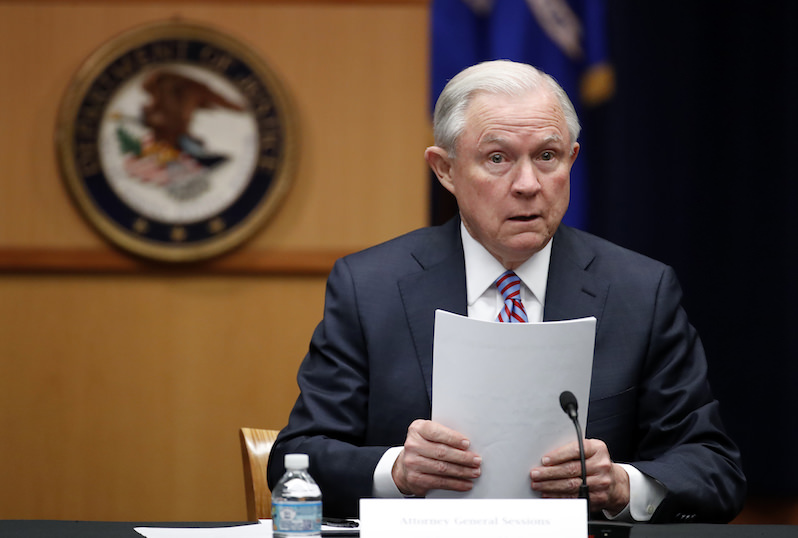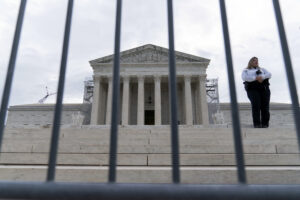Why Jefferson Beauregard Sessions III Is Unfit to Be Attorney General
In the few short weeks since his confirmation, Sessions has come forth with a number of loathsome actions or statements on race, ethnicity or minority rights. And he's probably just getting started. U.S. Attorney General Jeff Sessions prepares to speak at the Department of Justice. (Alex Brandon / AP)
U.S. Attorney General Jeff Sessions prepares to speak at the Department of Justice. (Alex Brandon / AP)
Don’t let his languid Southern drawl or physical resemblance to the kindly Keebler elves fool you. Ever.
Jefferson Beauregard Sessions III, the nation’s 84th attorney general, is neither laid back nor kind. To the contrary, he’s the most dangerous member of the Trump Cabinet. What’s more, he’s entirely unfit for the high position he holds.
Further evidence that Sessions has no business serving as our top law enforcement official emerged last week, when he took an intemperate swipe at Hawaii-based U.S. District Court Judge Derrick Kahala Watson during an interview with ultraconservative radio talk show host Mark Levin. Sessions was livid with Watson—who is one of only two active federal judges of indigenous heritage—for issuing a nationwide injunction blocking enforcement of President Trump’s second Muslim travel ban.
“[T]his is a huge matter,” Sessions said on air. “I really am amazed that a judge sitting on an island in the Pacific can issue an order that stops the president of the United States from what appears to be clearly his statutory and constitutional power.”
Judge Watson clearly had the authority to render his decision. After all, the principle of judicial review—the power of the courts to declare acts of Congress and the executive branch unconstitutional—has been a bedrock tenet of American constitutional law since Marbury v. Madison was decided in 1803.
I don’t fault Sessions for expressing his disappointment with the substance of Watson’s ruling. Lawyers and judges routinely disagree on matters of constitutional interpretation. All things being equal, I’d even give him a pass for apparently forgetting that Hawaii is a state, albeit one consisting of several islands.
But things are rarely, if ever, equal when it comes to Sessions, especially when race, ethnicity or issues of minority rights enter the picture. Would Sessions have been equally dismissive if Judge Watson were white, or if the judge’s order had not benefitted Muslims, who comprise a statistically small but increasingly scapegoated religious community in the U.S.?
Compare Sessions’ comments about Watson with the jubilation he expressed last June when the Supreme Court deadlocked 4-4 in the case of United States v. Texas regarding the Obama administration’s deferred deportation program for the undocumented parents of U.S. citizens (DAPA), and the attempt to expand the DACA program dealing with the deferred deportation of children. The Supreme Court’s tie vote served to uphold the ruling of a single federal district court judge–Andrew S. Hanen, who sits in Brownsville—that struck down both plans.
In a prepared statement released at the time, Sessions, then a senator from Alabama, said: “Today’s decision in United States v. Texas is not just a victory for Texas, Alabama, and a majority of the States in this great nation who challenged the lawless actions of the Obama Administration, but a victory for the American people and for the rule of law.”
Sessions’ racial animus and hypocrisy are nothing new. In Truthdig columns, I previously chronicled his long and sorry history. Among the lowlights of Sessions’ career that I noted were his unsuccessful prosecution of three civil rights workers in 1985 while he served as the U.S. attorney for the Southern District of Alabama, and the Senate’s rejection of his 1986 nomination to a federal judgeship over concern about his record of racial bias and insensitivity.
Since his installation as attorney general in early February, Sessions has done nothing to allay those concerns. If anything, he’s driven them to new levels.
On immigration, in addition to defending the Muslim travel ban, he’s been a staunch advocate for Trump’s border wall, and the driving force behind the threatened federal crackdown on sanctuary cities.
As expected, he’s promised to pick up the pace and volume of deportations. On a recent visit to Arizona, he described the border area as “ground zero” in the fight against transnational gangs who “flood our country with drugs and leave death and violence in their wake,” and the “criminal aliens” who “seek to overthrow our system of lawful immigration.” He pledged to marshal all available resources to “take a stand” against “such filth.”
In the field of voting rights, Sessions similarly has left a telltale mark. In late February, he announced that the Justice Department would drop its opposition to Texas’ strict voter identification law. In 2013, the Obama administration joined litigation aimed at overturning the law, which was passed in 2011.
Notwithstanding the department’s change of position, on April 10 a federal judge held that the law unconstitutionally discriminated against black and Latino voters. Sessions is expected to back efforts by Texas to appeal the ruling.Sessions was also instrumental in revoking the written guidance that Loretta Lynch, his immediate predecessor as attorney general, had given to public schools to refrain from discriminating against transgender students. Given the revocation, the Supreme Court was prompted to vacate a pending appeal involving a transgender Virginia high school student who had been prohibited from using the bathroom of his choice and had argued his school’s policies violated Lynch’s guidelines.
In the area of criminal justice and police reform, Sessions has been even more regressive, calling for a revival of the war on drugs (including marijuana) and a return to the mandatory minimum prison sentences that fueled the era of mass incarceration. He also has been vocally supportive of the private prison industry.
Perhaps most important of all in law enforcement matters, Sessions has pledged to help boost the morale of local police departments by reviewing and annulling consent decrees negotiated with wayward jurisdictions across the country. In a staff memo written earlier this month, Sessions admonished that “it is not the responsibility of the federal government to manage nonfederal law enforcement agencies.” …I think this is arguably the most important position he’s taken in the field, but not the most important in all fields.
Nor does Sessions believe the federal government, via the Environmental Protection Agency, should have much to do with safeguarding clean air and water standards, or with the fight against climate change. Under his supervision, the Justice Department has advised federal courts in several pending high-profile cases that the EPA’s former positions on such questions are under review and subject to change.
And then there is his dismal stance on women’s rights. Although he testified at his confirmation hearing that he respects Roe v. Wade as the “law of the land,” he admitted that he views the landmark abortion precedent as “one of the worst, colossally erroneous Supreme Court decisions of all time.”
In matters of national security, too, Sessions has alarmed civil liberties activists, vowing to put federal whistleblowers in jail for disclosing classified information, “whenever a case can be made.” Late last week, he declared that the arrest of WikiLeaks founder Julian Assange had become a “priority” for the U.S.
Finally, there’s the charge that Sessions lied at his confirmation hearing when he testified that he had no contact with Russian officials during the election campaign while acting in the capacity of a Trump adviser. He since has acknowledged meeting twice with Russian Ambassador Sergey Kislyak during the campaign but has insisted he didn’t discuss campaign issues. Nonetheless, he has recused himself from participating in all ongoing federal probes of alleged Russian meddling in the election.
But let’s not dwell on the past. The real menace Sessions poses to the body politic lies in the future. He’s only been in office for about 80 days, and he’s just getting started.
In the meantime, if you haven’t already concluded that Jefferson Beauregard Sessions III is unfit to serve as the attorney general of the United States, I have a simple question for you: What, in the name of basic human decency, is holding you back?
Your support matters…Independent journalism is under threat and overshadowed by heavily funded mainstream media.
You can help level the playing field. Become a member.
Your tax-deductible contribution keeps us digging beneath the headlines to give you thought-provoking, investigative reporting and analysis that unearths what's really happening- without compromise.
Give today to support our courageous, independent journalists.






You need to be a supporter to comment.
There are currently no responses to this article.
Be the first to respond.